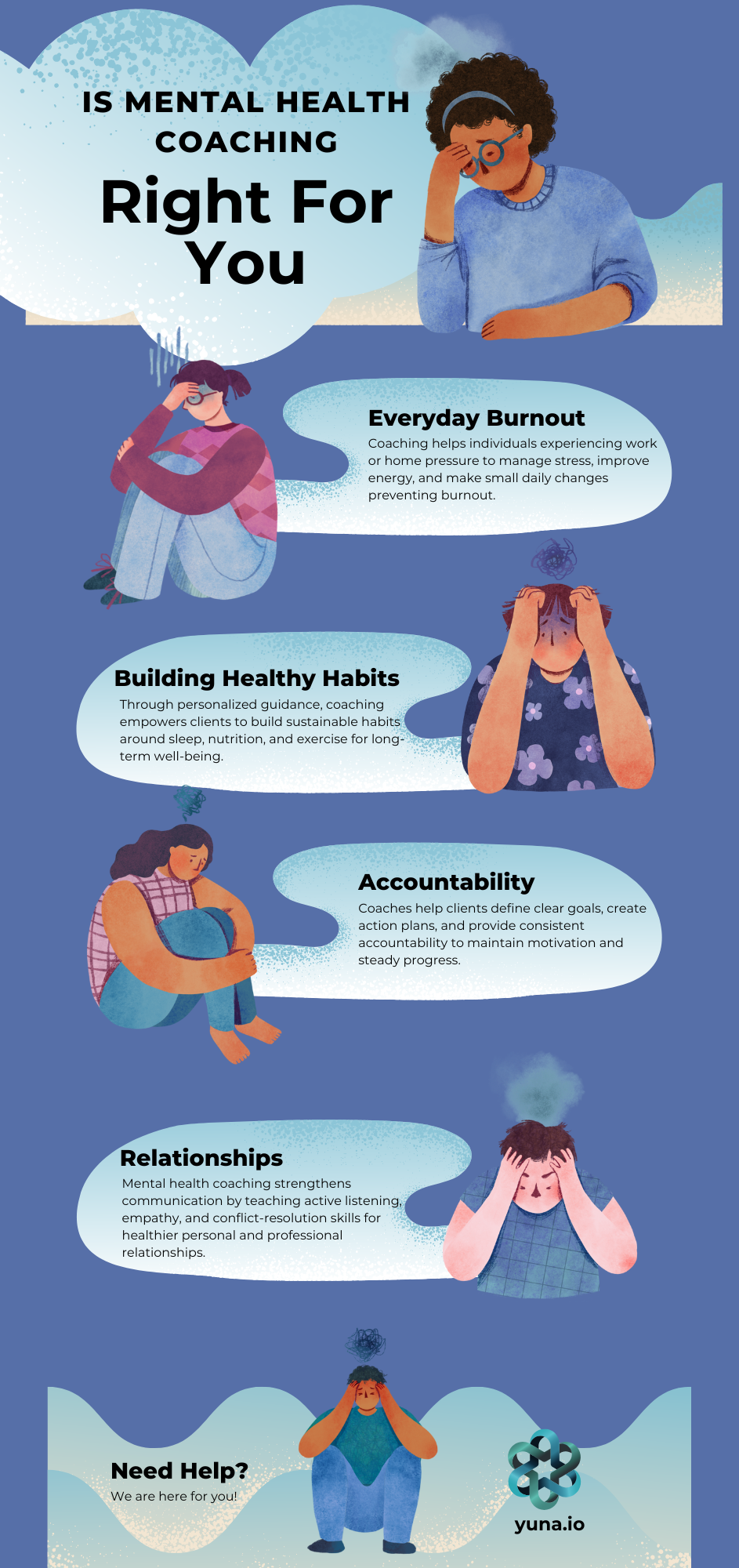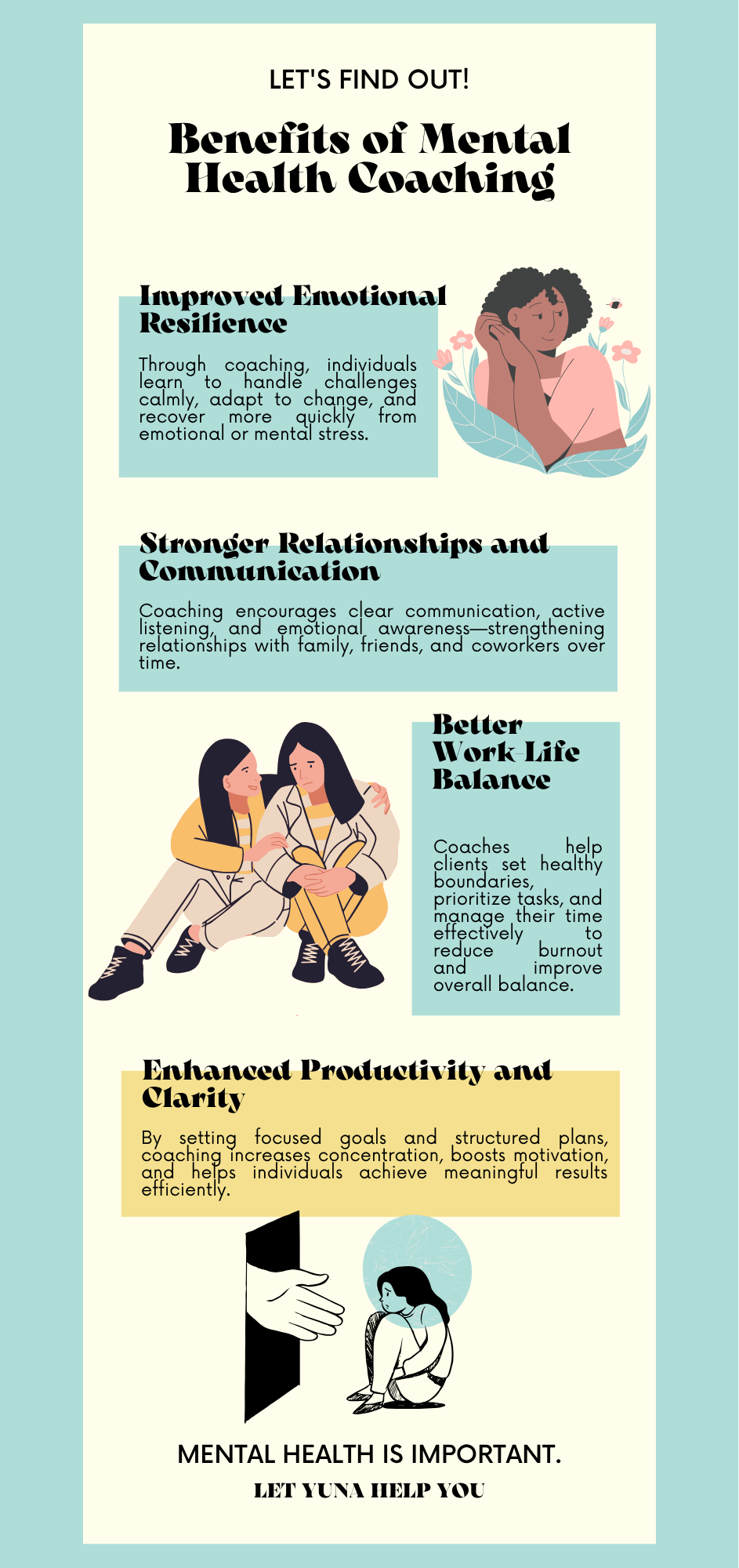Many people today feel overwhelmed by stress, burnout, and daily challenges. Anxiety and emotional fatigue often leave individuals searching for support. While traditional therapy is valuable, some people are looking for a more practical, present-focused way to manage their mental health. This is where mental health coaching comes in.
Recent studies show that interest in health and wellness coaching is rapidly growing. According to Civic Science, 18% of Americans have already worked with a health and wellness coach to reach their goals, and another 18% plan to do so in the future. Young adults aged 18–24 show the strongest interest, but demand is rising across all age groups. As people focus on improving physical fitness, sleep, and nutrition, many are also recognizing that mood and mental well-being are key parts of overall health.
Mental health coaching provides guidance for people who want to manage stress, build resilience, and enhance their well-being. Rather than focusing on the past, it helps individuals develop skills to handle the present and future more effectively. With the growing demand for accessible, action-oriented mental health support, coaching is emerging as an essential tool for balance and personal growth.
In this article, we’ll explore what mental health coaching is, who it’s for, how it differs from therapy, the core techniques used, the benefits, and how to choose the right coach. We’ll also highlight how Yuna supports mental wellness coaching with practical tools designed for everyday life.
What Is Mental Health Coaching?
Mental health coaching is a structured approach that helps people focus on their goals, habits, and resilience. While therapy often looks at the past to understand problems, coaching looks forward. It provides practical tools and accountability so people can manage challenges and build stronger mental health.
Mental health coaching can be defined as a process where trained professionals support individuals in managing stress, improving resilience, and creating healthier routines. According to Headspace, coaches help people develop skills and habits that improve wellbeing. Lyra explains that mental health coaching uses structured sessions that build coping strategies.
Scope of a Mental Health Coach
A mental health coach works with clients on issues like stress management, lifestyle changes, and goal setting. They do not diagnose conditions. Instead, they provide accountability, guidance, and tools for personal growth. A coach may encourage journaling, practice mindfulness with a client, or set weekly goals. The focus is on progress and everyday improvement.
Who Is Mental Health Coaching For?
Not everyone who experiences mental health challenges needs therapy. Some people benefit more from coaching, especially when they are not in crisis but want support with daily struggles. A mental health life coach is most useful for individuals who want to create better habits, achieve goals, or find more balance.
Everyday Stress and Burnout
Many people feel pressure at work or home that leads to stress and exhaustion. Coaching can help these individuals manage their energy, set priorities, and create small changes that reduce burnout.
Building Healthy Habits
Coaching is helpful for people who want to establish better routines. This could include sleep schedules, nutrition plans, or exercise habits. A mental health life coach works alongside clients to set achievable steps.
Goal Setting and Accountability
Some individuals struggle to stay motivated or hold themselves accountable. Coaching provides structured support. Clients work on both personal and professional goals with regular check-ins to stay on track.
Relationships and Communication
A coach can also help people improve communication and strengthen relationships. They may guide clients through active listening skills or conflict resolution strategies.

Mental Health Coach vs Therapist
People often confuse the role of a mental health coach with that of a therapist. Both are important, but they serve different purposes. Understanding mental health coach vs therapist helps people decide which option is right for their needs.
Therapists are trained to diagnose and treat mental health conditions. They help people explore trauma, depression, or anxiety disorders. Coaches, on the other hand, focus on present actions and future goals. They guide clients through stress management and habit building.
Differences in Training and Credentials
Therapists hold advanced degrees and licenses. They follow strict guidelines and provide treatment for mental illnesses. Coaches may have certifications in coaching methods but are not trained to diagnose or provide medical treatment.
What Coaches Can and Cannot Do
A coach can support stress management, lifestyle planning, and personal growth. They cannot prescribe medication or treat mental illness. This makes coaching suitable for people who want growth but not medical treatment.
Core Components and Techniques in Mental Health Coaching
Mental health coaching works through practical methods that create measurable results. These are often simple practices that, when repeated, bring positive changes. Mental wellness coaching combines goal setting, accountability, and emotional regulation techniques.
Goal-Setting Frameworks
One of the most common techniques is using SMART goals. These are specific, measurable, achievable, relevant, and time-bound. Coaches help clients set realistic targets and follow clear steps.
Accountability Practices
Regular check-ins are central to coaching. A coach may meet weekly or biweekly with clients. Progress is reviewed, and adjustments are made. This accountability helps people stay motivated.
Building Self-Awareness
Reflection and journaling are encouraged in coaching. Clients learn to track thoughts, emotions, and reactions. This builds awareness and allows better responses to stress.
Stress-Management Tools
Mindfulness, breathing exercises, and short relaxation techniques are often taught. These tools give people ways to calm themselves during stressful moments.
Lifestyle and Habit Changes
Healthy habits like exercise, better sleep, and balanced nutrition support mental wellbeing. Coaches encourage clients to build routines that make these changes sustainable.

Benefits of Mental Health Coaching
A mental wellness coach offers many benefits. It gives people the tools and confidence to handle stress while improving their quality of life.
Improved Emotional Resilience
Coaching helps clients respond better to challenges. They learn to manage setbacks and recover more quickly from stress.
Stronger Relationships and Communication
Coaching supports people in expressing themselves more clearly. Better communication often improves family, friend, and work relationships.
Better Work-Life Balance
A mental health coach helps clients set boundaries, manage time, and avoid burnout. This leads to more balance between personal and professional life.
Enhanced Productivity and Clarity
Clients often find they can focus better and achieve more when they follow coaching strategies. Clarity in goals reduces confusion and stress.
Choosing a Mental Health Coach
Finding the right mental health coach is essential. Since coaching is about trust and progress, choosing wisely helps ensure a good experience.
Checking Credentials and Training
Look for a coach with credible certifications and training. While they may not need a medical license, proper education shows commitment and professionalism.
Understanding Coaching Style and Approach
Every coach works differently. Some use structured goal-setting, while others focus on mindfulness and reflection. Choose a coach whose style matches your needs.
Questions to Ask Before You Begin
Ask about their experience, methods, and session structure. Clarify costs and availability. Knowing these details before starting makes the process smoother.

How Yuna Supports Mental Wellness Coaching
Grounding techniques for anxiety and structured routines play an important role in managing stress. While mental health coaching provides guidance, digital support systems make the process easier. Yuna is designed to help people stay mindful, organized, and balanced.
Yuna offers features like daily reminders, structured task lists, and mindful routines. These tools encourage consistency and make it easier to apply lessons learned in coaching sessions. For example, if a coach recommends journaling, Yuna can send reminders and organize reflections.
By combining anxiety grounding techniques with practical features, Yuna supports a sustainable approach to mental wellness. People gain the benefits of coaching while having a digital partner to reinforce healthy habits. With Yuna, mental health coaching becomes more effective, structured, and personalized.










